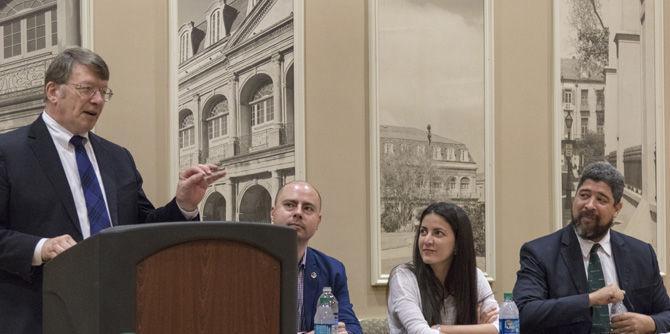Though most consider communism to be a thing of the past, speakers from “Castro’s Legacy and the Future of Cuba,” a luncheon panel that was open to all University students on Wednesday in the LSU Student Union, pushed this idea aside.
“There are more people under the communist regime now than there were in 1989 … fully 20 percent of the world’s population are currently slaves to their government,” said Murray Bessette, director of academic programs at the Victims of Communism Memorial Foundation of Washington, D.C.
Students and community members were offered a free lunch and souvenirs such as pens and t-shirts decorated with the word “dissident,” a blog that shares news on communism, along with free books that shed light on the atrocities of the communism regime.
The University welcomed human rights activists and speakers, Rosa María Payá and John Suarez, courtesy of VOC and the Eric Voegelin Institute who co-sponsored the event.
James Stoner, University professor and director of the Eric Voegelin Institute, worked with colleagues at the University of Louisiana at Lafayette and Tulane University to bring the speakers on a three-day speaking tour.
In an October poll conducted by the VOC, one third of millennials thought George W. Bush had killed more people than Joseph Stalin, Bessette said. VOC’s mission is to educate this generation of the ideology and legacy of communism and to commemorate its 100 million victims.
American educators rarely tell the story of communist oppression in the 20th century, Bessette said.
Suarez who founded the Free Cuba Foundation, educated the room on the background of communism in Cuba and how the island got to this point because Cuba “is not the Castro regime,” he said.
Suarez told the tales of the decades of victims who opposed the communist regime only to be later mysteriously killed with no consequences to the government, allowing the Castro dictatorship to continue brutalizing their people with impunity.
Payá’s father, Oswaldo Payá, a Cuban political activist founded the Christian Liberation Movement in 1988 to oppose the one-party rule of the Cuban Communist Party and is one of many victims mysteriously killed by the hands of the Cuban regime in 2012.
He was a five-time nominee for the Nobel Peace Prize and attracted international attention for organizing a petition drive known as the Varela Project, in which 25,000 signatories petitioned the Cuban government to guarantee freedom of speech and assembly as well as to institute a multi-party democracy.
Payá is the executive director of Cuba Decide, a citizen initiative seeking fair elections on the island. For more than 65 years, Cubans have been denied the right to participate freely in elections. The absence of basic rights has subjected the people to a life of poverty and the country to economic and social ruin.
Cuba Decide is currently working on a campaign to gain international support to help Cuba move toward a democratic system through a plebiscite, which would allow the Cuban people to vote on whether they should be allowed free elections. The campaign is accepting monetary donations, petition signatures and support through the hashtag #CubaDecide.
Editor’s Note: This article was updated to indicate that Cuba Decide’s current campaign seeks to achieve its goal through a “plebiscite.”
Human rights activists speak at “Castro’s Legacy and the Future of Cuba”
March 8, 2017
Political science professor, James R. Stoner, Jr. speaks during Castro’s Legacy and the Future of Cuba panel on Wednesday, March 8, 2017 in the Student Union.
More to Discover








